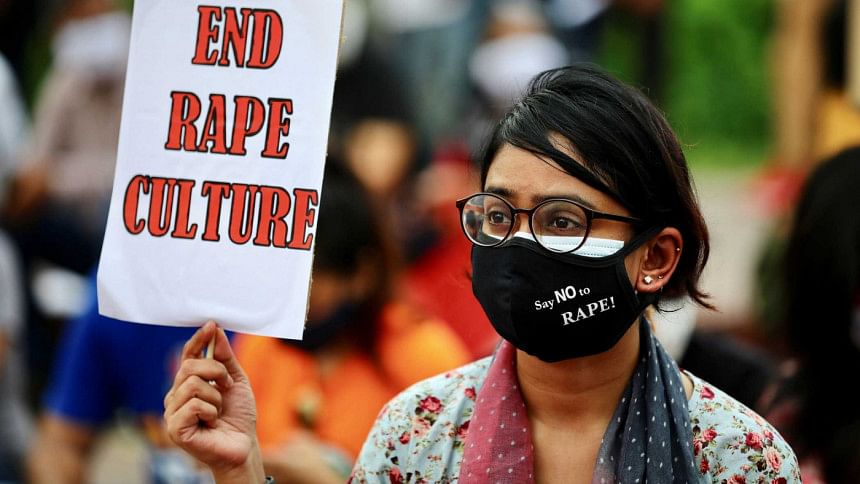A rape victim’s journey to justice should be easier

The fact that a rape victim's journey towards justice is a grueling one is not unknown to us. There have been several reports and extensive research in the past identifying causes for such hurdles in rape prosecution, including those that focused on the extremely low rate of conviction in rape cases. Added to those causes is how various levels of justice services often receive victims of sexual offences with utmost suspicion, making the already difficult task of proving the accused's guilt "beyond all reasonable doubt" further challenging. The suspicion also commonly results in an overwhelming reliance on medical evidence suggesting specific injuries on the victim's body. This particular aspect came into even greater focus recently when a Nari o Shishu Nirjaton Daman Tribunal decided to acquit all five suspects in the much-discussed Banani Raintree Hotel rape case trial. While it is unclear what exactly had been said by the recently revoked Judge of the Tribunal regarding the suggestion to police to not accept rape cases 72 hours after the incident, there's no doubt that the concerned Judge was simply following the dominant trend of insisting on the need for medical evidence that indicates signs of violence present on the victim's body and DNA evidence to corroborate the truthfulness of the victim's testimony.
Having medical evidence that strongly suggests that the victim had been subjected to forcible intercourse will surely make it easier for the victim to prove her case. But when there is no such evidence, it should not lead to conclusions of falsity regarding the victim's complaint. Of course, absence of medical evidence often makes it rather impossible for the occurrence of rape to be proven. In addition, there are also sometimes pointless efforts to gather DNA evidence even in cases where matching the DNA won't have any impact in proving or disproving rape. DNA evidence would, of course, be essential when the accused has altogether denied the (forced) intercourse. But when both the parties acknowledge that sexual intercourse had happened, then the question that needs to be answered is whether it happened with or without both parties' consent, and not whether the DNA samples had matched.
This heavy reliance on medical evidence can be largely attributed to the stereotypical understanding of rape, which perceives it to always be a violent and forcible act of sexual intercourse. A "modest and truthful" victim as such, is expected to have resisted the attack with all possible force. This misogynistic perception often brushes over the question of legal consent, which is in fact the key element that needs to be proved in a rape case wherein the occurrence sexual intercourse is not disputable. There can be many contexts wherein the victim may not actively resist the attacker. In some cases, even if she did resist, the injury marks might not be visible during medical examination. To mention a few examples, a rape that happened on gunpoint would most likely be without much resistance from the victim; or a victim might have fainted, seized, or been otherwise threatened with death if she resisted. Similarly, because of prevalent social barriers in accessing justice, when a rape victim files a case after a considerable time has elapsed since the occurrence of the attack, there would most likely be no injury marks found during the medical examination.
Besides, certain special attributes are often attached to the patriarchal portrayal of a rape victim. A victim who belongs to a lesser economic background or is uneducated, has an existing or a past sexual life, or has a lifestyle that does not match the traditional image of a "helpless and shunned" victim of rape, such a victim will likely not match the description of "modest and truthful" and hence, the burden of proving her testimony would probably be even heavier.
While we are circling around the age-old misogynistic questions of whether the medical evidence shows injury marks or not, or whether she was "habituated" to sex or not—our Supreme Court had long set the rule in a number of cases that there is no bar for the court to act on the sole testimony of a rape victim except in rarest of rare cases. The Supreme Court had even held onto that to insist on corroboration of the statement of a victim of sexual assault before putting reliance upon the same, as a rule amounts to adding insult to injury and as such, unless there are compelling reasons, the court should find no difficulty in acting on the sole testimony of the victim. But unfortunately, such rulings are not consistently followed in rape prosecutions. Rather, because of the inherent suspicion imposed on a rape victim's complaint, the necessity of corroboration is often overtly emphasised. The fear embedded by the British colonial jurisprudence, that a rape victim may have falsely accused an innocent man, sadly still influences modern day decisions in rape prosecutions.
As Bangladesh prepares to step into the developing country category, it is our sincere hope that, as a nation, we will now positively take up the plight of the victims of sexual offences and carry them to justice. Together, we need to build a platform for action to break the patriarchal and misogynist narratives around victims of rape who are brave enough to knock on the doors of justice.
Taslima Yasmin is Associate Professor, Department of Law at Dhaka University.
Email: [email protected]

 For all latest news, follow The Daily Star's Google News channel.
For all latest news, follow The Daily Star's Google News channel. 



Comments